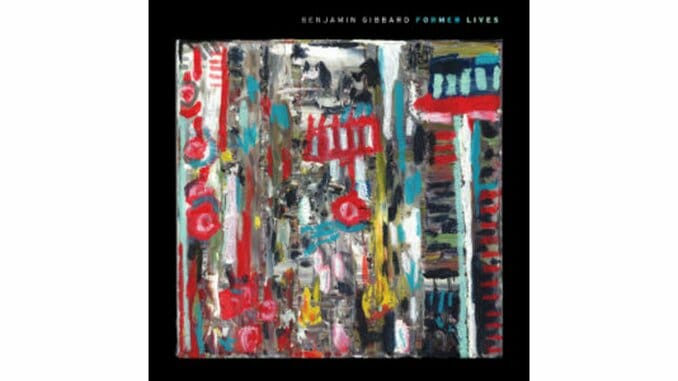
It may come a surprise that Ben Gibbard, best known for his work as chief songwriter and singer for Death Cab for Cutie, is just now releasing his first solo album. And, given his track record when recording away from his band (including his underrated collaboration of Jack Kerouac-inspired tunes with Jay Farrar on One Fast Move or I’m Gone, his stunning duet with Feist on their cover “Train Song,” and, of course, The Postal Service, which might turn into the 2000’s equivalent of Neutral Milk Hotel in both unexpected popularity and ever-growing mythology), fans had every reason to anticipate a strong set of tunes from the gentle-singing songsmith. In turn, Former Lives shares little in common with any of those Death Cab diversions, and rightfully so as they were all collaborative efforts and Former Lives was primarily recorded with Gibbard playing all the instruments himself. Yes, Former Lives is a true solo album, with Gibbard showcasing a memorable and rewarding set of odds and ends from the last eight years of his songwriting career.
The biggest giveaway to what Former Lives sounds like is in Gibbard choosing to dub himself “Benjamin” rather than his typical “Ben.” For the first time in his career, Gibbard sounds his age (36), with hardly a dance or laugh to be had over the record’s 12 songs. This shift to a more NPR-ready sound, which has been foreshadowed over the past several years by the softening of Death Cab’s already cushiony sound, suits Gibbard, and his longtime fans should appreciate the transition from wise-beyond-his-years to, well, just wise. The album opens with a single-verse song, “Shepherd’s Bush Lullaby,” which features Gibbard harmonizing with himself through overdubs, creating the effect of a backing banjo through use of a cappella. It’s a pull of the curtain that ensures the listener’s attention, followed by a silky transition to the minor chord-strums of “Dream Song,” whose arrangement would be at home on an Elliot Smith or Aimee Mann record, the type that were being made when Gibbard was still fascinated with distorted guitars and his tales of heartbreak were at their most raw and personal.
That’s not to say that Gibbard’s primary subject matter has changed much in the past decade. The majority of Former Lives trots over the familiar territory of relationships, with objects of affection being frustratingly complicated on “Hard One to Know,” seeming too good to be true on “Lily,” and not living up to his expectations on “Oh, Woe.” These songs—all easy on the ears with instantly familiar melodies and appropriate accompaniment that ranges from introspective to jubilant—suffer from a lack of lyrical inspiration, leaning on figurative language rather than concrete details. Gibbard is a stronger writer when he stays specific, and his descriptions of characters being like “a flower garden buried in snow” or “colder than the waves of the Arctic Ocean” fall into the unfortunate writing trap of telling us without actually showing us, causing us to never understand why the characters are hidden gems or ice queens.
Thankfully, these weaker moments are exceptions on the album. Gibbard’s duet with Aimee Mann, “Bigger Than Love,” is a home run that is worth the price of admission on its own. It’s based on the romance of Scott and Zelda Fitzgerald, and Gibbard opts to share the microphone with Mann, whose lengthy career doubles that of Gibbard’s. The choice of Mann is a step away from the indie-buzz machine that might rather he sang with someone more of the moment, like Sharon Van Etten or Annie Clark. But, Mann’s thoughtful and sad delivery makes her the perfect choice, with the song’s declaration that some romances are “bigger than love,” and, in fact, become whole lives, affecting the fates of children and even becoming the stories of legend. The sentiment of the track seems doomed from conception, but Gibbard pulls it off and the listener winds up believing it.
The rest of the collection is populated by work that is as interesting as it is enjoyable. Gibbard employs a mariachi band on “Something’s Rattling (Cowpoke),” and the marriage works, turning Gibbard’s waltz into something that could soundtrack a horseback ride on the prairie or a conversation in a Parisian cafe. Later, Gibbard’s vocal range is stretched to its limits for the delicately grande “Duncan, Where Have You Gone?” with his falsetto always brave and in control.
The album’s climax is saved for “Broken Yolk in Western Sky,” a song that Gibbard has been playing live for the last eight years. Full of vivid imagery and memorable turns of phrase (“My love is like some kind of greed / of equal portions want and need”), Gibbard delivers his most prototypical moment to create a lasting memory for the record, finally concluding with the intimate and emotional “I’m Building a Fire” as something of a palette cleanser, with the album of considered and full instrumentation coming full circle to end as bare as the record began. It’s these small, thoughtful touches that make any miscues easy to forgive and give Former Lives a firm place in Gibbard’s songbook. The singer has made it clear that Death Cab for Cutie is tremendously healthy and it could take another decade before he does a solo project again, meaning 10 more years of growth, experience and maturity to inform the collection. And, taking this time to be selective and thoughtful as to what stray tunes make it on a “Benjamin” Gibbard release may be his wisest move of all.